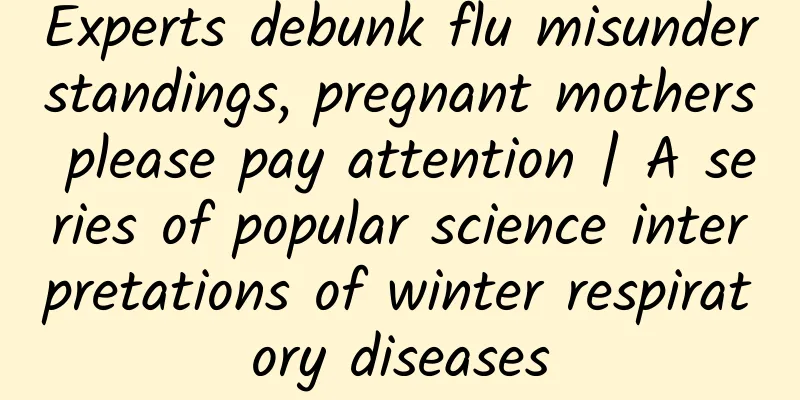Experts debunk flu misunderstandings, pregnant mothers please pay attention | A series of popular science interpretations of winter respiratory diseases

|
Editor's note: Recently, Guangming Online's Science Channel and the "Dayi Xiaohu" medical communication think tank launched a special topic called "Winter Respiratory Disease Series Popular Science Interpretations", inviting medical experts to provide popular science interpretations on the causes, transmission routes, prevention measures and treatments of respiratory diseases. Please pay attention. Author: Dai Yun and Su Yiliang, Tongren Hospital, Shanghai Jiaotong University School of Medicine Scientific review: Shen Jian, Yueyang Hospital of Integrated Traditional Chinese and Western Medicine, Shanghai University of Traditional Chinese Medicine This winter and spring, various viruses have also entered their active period, especially influenza viruses. For pregnant mothers, it is inevitable to have some concerns and panic. Viral infections during pregnancy, especially in the early stages of pregnancy, can easily lead to fetal malformations. Therefore, it is very important for pregnant women to prevent respiratory viral infections such as influenza, which is related to the health of the next generation. How to prevent and treat influenza has become the focus of their attention. Recently, obstetricians and gynecologists and respiratory experts have jointly spoken out to clarify the myths about influenza prevention and treatment during pregnancy and provide scientific advice so that pregnant mothers can spend this winter with peace of mind. Myth 1: Pregnant women cannot get the flu vaccine. This statement is incorrect. The "Technical Guidelines for Influenza Vaccination in China" (2018-2019) issued by the Chinese Center for Disease Control and Prevention clearly states that pregnant women can be vaccinated against influenza, and it is necessary and should be vaccinated! It can not only protect the pregnant woman herself, but also protect the fetus from the influenza virus. It must be emphasized that the influenza vaccine for pregnant women will not cause harm to the outcome of pregnancy and the fetus; the vaccine can protect both pregnant women and their newborns from influenza through fetal antibodies. Myth 2: Pregnant women cannot take anti-influenza drugs This statement is also incorrect. Pregnant women are at high risk for influenza and are prone to severe pneumonia. Influenza not only harms pregnant women themselves, but also has an adverse effect on pregnancy outcomes, with a significantly increased risk of premature birth and fetal death. Many studies have shown that there is a strong correlation between the serious adverse outcomes of influenza infection during pregnancy and the number of days delayed in using antiviral drugs after the onset of influenza symptoms. Therefore, once pregnant women are infected with influenza, they should be treated with antiviral drugs as soon as possible. When a pregnant woman catches a cold, she should seek medical help as soon as possible. She needs to distinguish between a common cold and influenza and use medication under the guidance of a doctor. Research and clinical trials have shown that some anti-influenza drugs are safe for pregnant women. Myth 3: If pregnant women have the flu, it is safer to use traditional or over-the-counter cold medicines This statement is not entirely correct. Both Chinese and Western medicines actually have certain toxic side effects and mutual effects. Even if you prefer to use Chinese medicine, you should use traditional medicine according to the doctor's syndrome differentiation and treatment, otherwise it is easy to go in the wrong direction. In addition, some over-the-counter cold medicines may contain ingredients that are harmful to pregnant women and fetuses, and some cold medicines may also interact with anti-influenza drugs, affecting the efficacy. Myth 4: Pregnant women should avoid contact with anyone who is sick to prevent the flu It is indeed an idealistic suggestion to avoid contact with sick people, but pregnant women should not panic too much about this. In normal life, it is difficult to completely avoid contact with sick people, and there is no need to stay at home and stay at home. Normal activities, proper exercise and normal social interaction are very important for the physical and mental health of pregnant women. Pregnant women can take some basic preventive measures when going out, such as washing hands frequently, wearing masks, and avoiding crowded places, etc., to reduce the risk of infection. Experts have given scientific advice on these misconceptions. First, get the flu vaccine every year at the right time. The flu vaccine has been used worldwide for more than 60 years. Around October each year is the time when the new year's flu vaccine is available. It is the wisest choice to get vaccinated in time and obtain antibody protection as early as possible. Families preparing for pregnancy are advised to vaccinate all members. Pregnant women can also be vaccinated. Secondly, if a pregnant woman gets the flu, she should seek medical attention, get diagnosed and treated as early as possible. Once a clear diagnosis is made, it is recommended to use clinically studied and safe anti-influenza virus drugs as soon as possible to block viral replication as soon as possible and reduce damage to mother and baby. In addition, mothers who get the flu should be temporarily isolated from their babies, but they can and should continue breastfeeding. If a breastfeeding mother is suspected or confirmed to have influenza, she should be temporarily isolated from her newborn to reduce the risk of infection to the newborn. During the isolation period, she can still feed her baby with breast milk through artificial breast pumping. When the following criteria are met, the mother-infant isolation can be lifted: 48 hours after the influenza mother takes antiviral drugs; 24 hours without fever without antipyretics; no cough or sputum. During the isolation period, direct breastfeeding is not recommended. After the influenza mother takes antiviral drugs and the test turns negative, the isolation can be lifted. Finally, we remind pregnant mothers not to believe in rumors or stay indoors out of fear, get sick, overuse or even abuse drugs or over-the-counter drugs to "self-treat". If you have a fever or other discomfort symptoms, you must seek medical attention in time and tell the doctor that you are pregnant to get the most appropriate treatment. Through scientific and effective prevention and treatment measures and the guidance of doctors, we help pregnant mothers spend a healthy and safe winter during pregnancy. |
<<: Urgent reminder! Imported cases of malignant malaria found in Luoyang
Recommend
A box costs more than 400 yuan, and one dose lasts for 5 days? The new "magic flu drug" Mabaloxavir is popular, and doctors warn
The proportion of influenza A has just dropped, a...
What is vaginal contraction?
The vagina is the female reproductive channel and...
Can pregnant women drink middle-aged and elderly milk powder?
In fact, it is best for pregnant women not to dri...
How to identify borderline uterine fibroids
Uterine health issues are something that women ne...
Black dirty stuff flowing down there
No matter which stage women are in, they should p...
My menstrual period was very regular but suddenly got delayed.
If a woman's menstrual cycle has always been ...
Increased bowel movement at 35 weeks of pregnancy
During pregnancy, the body of a pregnant woman wi...
Why is my period dark red?
During the menstrual period, women will pay speci...
What medicine can pregnant women use for vaginal itching
Pregnancy is a special period. Due to the influen...
What color is Chanel Camellia Limited Edition 627? Chanel 627 lipstick color test
Chanel 627 is a limited edition launched in early...
Are women's watery eyes good?
The eyes are the windows to the soul, and through...
I have constipation, what should I eat?
1. These ingredients are good for intestinal heal...
Incubation period and treatment of chronic gonococcal urethritis
We all know that many diseases have an incubation...
Be alert to the symptoms of blood stasis type menstrual disorders!
Irregular menstruation is the most common problem...









